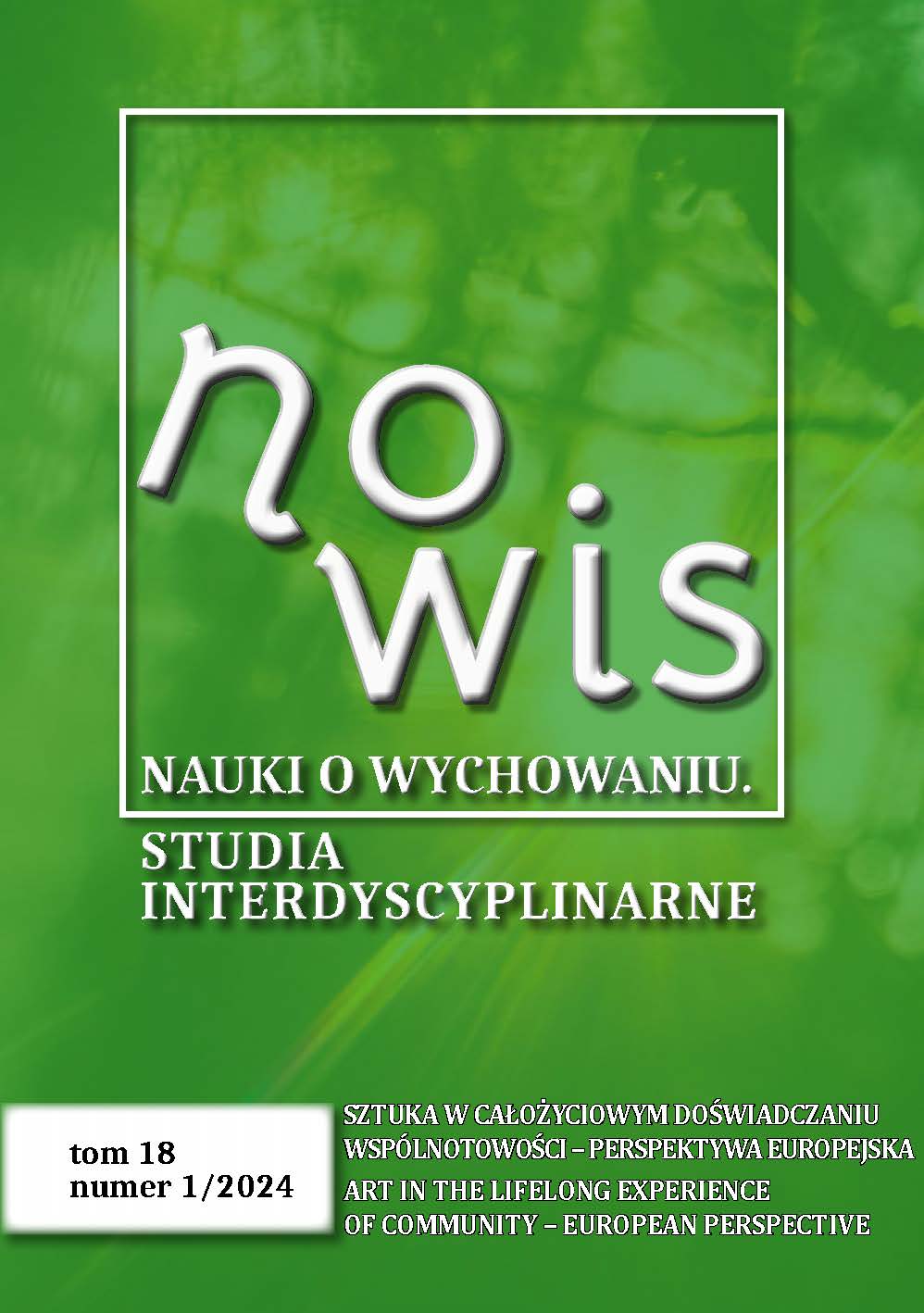In Search of a Complementary Model of Arts Pedagogy as Educational Sciences
DOI:
https://doi.org/10.18778/2450-4491.18.05Keywords:
education through art, aesthetic education, arts pedagogy, educational arts-based researchAbstract
The article is devoted to the presentation and justification of the proposal of a complementary model of art pedagogy understood as a scientific (sub)discipline, which takes into account the challenges of the 21st century. The presented model was inspired by the pedagogical thought of Elliot W. Eisner. First, he pointed out the differences in defining the specificity of pedagogy and pedagogical sciences, with reference also to sociology, and then proceeded to present a proposal for the ontological, epistemological, and methodological dimensions of the projected concept of arts pedagogy. Another element of the study is a proposal for the structure of an academic textbook dedicated to the pedagogy of art.
References
American Educational Research Association (2006) Standards for Reporting on Empirical Social Science Research in AERA Publications, „Educational Researcher”, t. 35, nr 6, s. 33–40, https://doi.org/10.3102/0013189X035006033
Google Scholar
DOI: https://doi.org/10.3102/0013189X035006033
American Educational Research Association (2009) Standards for Reporting on Humanities-Oriented Research in AERA Publications, „Educational Researcher”, t. 38, nr 6, s. 481–486, https://doi.org/10.3102/0013189X09341833
Google Scholar
DOI: https://doi.org/10.3102/0013189X09341833
Barone T., Eisner E. W. (2012) Arts Based Research, Los Angeles – London – New Delhi – Singapore – Washington, Sage Publications.
Google Scholar
Eisner E. W. (1976) Educational Connoisseurship and Criticism: Their Form and Functions in Educational Evaluation, „The Journal of Aesthetic Education”, t. 10, nr 3–4, s. 135–150, https://doi.org/10.2307/3332067
Google Scholar
DOI: https://doi.org/10.2307/3332067
Eisner E. W. (1998) The Enlightened Eye. Qualitative Inquiry and the Enhancement of Educational Practice, Upper Saddle River, Merrill.
Google Scholar
Hejnicka-Bezwińska T. (2008) Pedagogika ogólna, Warszawa, Wydawnictwa Akademickie i Profesjonalne.
Google Scholar
Kubinowski D. (2006) Pedagogiczne myślenie humanistyczne jako kategoria metodologiczna w: Metodologia pedagogiki zorientowanej humanistycznie, D. Kubinowski, M. Nowak (red.), Kraków, Oficyna Wydawnicza Impuls, s. 171–180.
Google Scholar
Kubinowski D. (2008) Wychowanie i jego konteksty w perspektywie pozapedagogicznej i pedagogicznej w: Konceptualizacje przedmiotu badań pedagogiki, K. Rubacha (red.), Kraków, Oficyna Wydawnicza Impuls, s. 47–56.
Google Scholar
Kubinowski D. (2010) Metodologia spod znaku χ2 a humanistyczna tożsamość pedagogiki w: Metodologiczne problemy tworzenia wiedzy w pedagogice. Oblicza akademickiej praktyki, J. Piekarski, D. Urbaniak-Zając, K. J. Szmidt (red.), Kraków, Oficyna Wydawnicza Impuls, s. 79–90.
Google Scholar
Kubinowski D. (2012) Idiom pedagogiki współczesnej w: Poza paradygmaty. Pedagogika wielostronna. Księga pamiątkowa dedykowana Profesorowi Tadeuszowi Lewowickiemu, t. 1, E. Ogrodzka-Mazur, A. Szczurek-Boruta (red.), Toruń, Wydawnictwo Adam Marszałek, s. 196–213.
Google Scholar
Kubinowski D. (2013) Idiomatyczność – synergia – emergencja. Rozwój badań jakościowych w pedagogice polskiej na przełomie XX i XXI wieku, Lublin, Wydawnictwo Makmed.
Google Scholar
Kubinowski D. (2017) Badania pedagogiczne w „kalejdoskopie” paradygmatów, orientacji, podejść, metod nauk humanistycznych, społecznych i stosowanych w: Pedagogika jako humanistyczno-społeczna nauka stosowana: konsekwencje metodologiczne, D. Kubinowski, M. Chutorański (red.), Kraków, Oficyna Wydawnicza Impuls, s. 15–24.
Google Scholar
Kubinowski D. (2019) Metodologia badań pedagogicznych między normatywnością a opisowością w: Krytyka metodologiczna w praktyce tworzenia wiedzy, J. Piekarski, D. Urbaniak‑Zając, S. Pasikowski (red.), Łódź, Wydawnictwo Uniwersytetu Łódzkiego, s. 79–90, https://doi.org/10.18778/8142-715-9.04
Google Scholar
DOI: https://doi.org/10.18778/8142-715-9.04
Masasuke K. (1987) Trzy typy nauk: nomotetyczne, idiograficzne oraz „idiomodyficzne”, tłum. M. Kawecki, „Colloquia Communia”, t. 30–31, nr 1–2, s. 33–35.
Google Scholar
Rubacha K. (2021) Warunki kierujące rozwojem metodologii badań w naukach pedagogicznych. Teoretyczność i praktyczność badań, „Studia z Teorii Wychowania”, t. XII, nr 1(34), s. 11–25, https://doi.org/10.5604/01.3001.0014.8452
Google Scholar
DOI: https://doi.org/10.5604/01.3001.0014.8452
Sztompka P. (2012) Dziesięć tez o socjologii, „Nauka”, nr 4, s. 7–15.
Google Scholar






 The journal's website, created and edited by the NOWiS Editorial Team on the Index Copernicus platform:
The journal's website, created and edited by the NOWiS Editorial Team on the Index Copernicus platform: 





